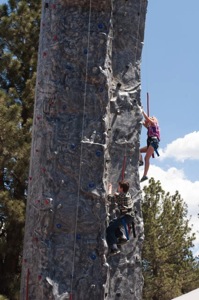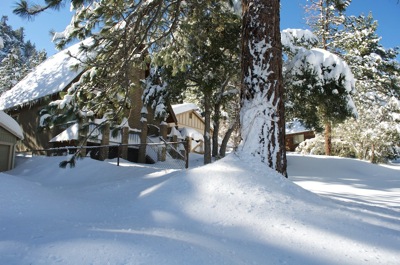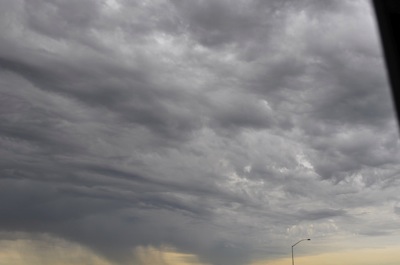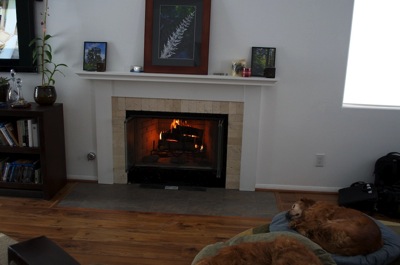
Yesterday after doing some of the usual chores. Poo patrol & other little things around the house, I went into town for a Fire & Disaster Awareness day sponsored by the local community.
As some of you may know fire is a big deal here in the Southern California mountains.
It’s an even bigger deal when there’s been as little rain as there has been this year.
For those of us who’ve watched our homes burn to the ground, well… lets just say it takes on a whole new level of importance.
Moreover here in Southern California there are a number of possible disasters.
Fire
Mudslide
Earthquake
Pow er outages due to the above, or possibly just really strong winds.
er outages due to the above, or possibly just really strong winds.
There was a community a few years back that was without power for well over 2 weeks. Their problems were caused by a wind storm that blew down trees all over the Los Angeles basin. when the trees fell over, they took power lines with them.
So the community puts on these events and admittedly this is the first one that I’ve attended. It’s high time too.
We’ve got a small store of food and supplies here at the house and we have 3 day packs we carry in our cars. But I know that it’s not enough. I’d like to have a full on bug out kit that could feed us for months if necessary.
The problem is that such a supply is pricy and I worry about the expiration dates on the foodstuffs. Of course should those supplies ever be necessary I’ll be kicking myself for not making the investment.
This is not about being a “Survivalist” it’s about being prepared.
Look around your home, it doesn’t matter where you are…
How much food do you have on hand?
What would happen if you lost power? Can you cook without electricity?
All that food in the fridge isn’t going to stay edible for long and frozen for less time than you might think.
What about water? How much of your water is pumped electrically to you or water tanks. What is the capacity of those tanks? Do your neighbors know enough to skip their showers and conserve? If you’re completely dependent on electricity for your water, you might want to have a drinking reserve.
When was the last time you looked at the expiration dates on your first aid kit? A 10 year old antibiotic or chemical cold pack will probably not be as effective as a 1 year old version.

How are you fixed for batteries?
Do you have a radio to listen to, for evacuation areas, or emergency information? How is that radio powered?
Do you have a method of recharging your cell phone? Think about the people after hurricane Sandy. Remember them huddled around makeshift charging stations?
That’s not to say that the cell towers will even be up but if cell service is available and your phone is dead you’re still in trouble.
Do you have basic camping gear? That could provide you with shelter and you can stay warm in sleeping bags for quite a while.
This post isn’t about doom and gloom. I’m not suggesting the apocalypse is imminent.
I’m saying that if you’re prepared you’ll be able to weather the trials & tribulations of stuff that happens every day around our planet.
By the way, preparing for disaster isn’t about hearing that a storm is on the way and running to the Home Depot for generators & stripping the grocery store shelves bare.
Preparation is about NOT having to do either of those things.
It doesn’t take a lot, figure out what your vulnerable to.
We have power outages in my town often in the Winter, so that’s one of my vulnerabilities.
I’ve got portable solar panels and power storage from Goal Zero that can recharge my phone, power or recharge some of the smaller A/C devices, my HAM rig, and even my laptop if I need it. Although without internet my laptop would be more for my chronicling the event than for reading the local news.

The fireplace works and there’s a stack of firewood outside.
I have a gas stove so I can cook, and in Winter ya just move the frozen foods from the fridge out to the deck. (I’ve done it. frozen is frozen).
So if there’s a power outage, I’m warm, dry, well fed, and since our water is gravity fed from a water tank up the hill I’ve got water for at least 3 -5 days before I even think about hitting the backup.
In short it’s inconvenient but not life threatening
In Spring & Fall it’s mudslides. Mudslides can isolate my home for a few days, usually not more than 1 or 2, and it’s very rare that a mudslide here in my area would kill the power. If there was a mudslide that killed the power, the Winter plan works pretty well except for the refrigerated / frozen foods. So I eat whats in the fridge that’s likely to go bad first.
In Summer / Fall, the threat is wildfire. The best plan is get the hell out of the way! You leave when the fire dept says it’s time to go, it’s just that simple!
Earthquake… You have to figure all bets are off. If your home is still standing and not dangerous you use your plans and resources until help arrives. If your home isn’t standing or is unsafe, you grab your camping gear, emergency supplies, and get close to nature and/or evacuate to less damaged areas if / when you can.
Each of these options has flaws, my plans may not work for you, but these plans (with the exception of the Major Earthquake) have all been tested by me.
When I’ve discovered a flaw, I’ve made do, learned from my omission or mistake and I’ve changed the plan accordingly for the next time. That’s really all you can do.
I strongly encourage everyone to just give it some thought. You don’t have to be a survivalist, you don’t have to spend $1000s of dollars on c-rations or build a bunker. Just take a look at your home, evaluate the potential threats then plan accordingly.
It goes without saying in these events that you check on the old, you make sure your neighbors are OK and have some provisions.
Obviously if you find someone in need, you help them… That’s the Human thing to do.
Just add preparation as one of your spring chores and hope like heck that the preparation never has to be tested.
